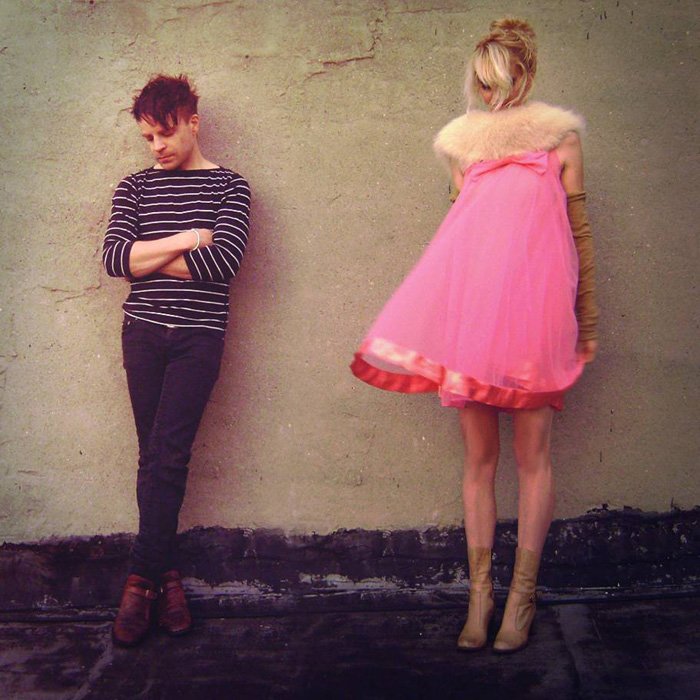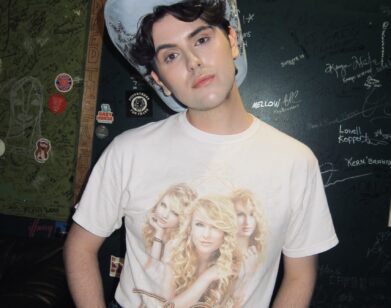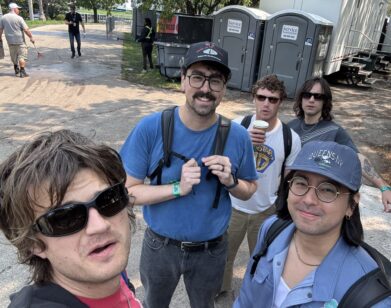Solid Gold

It may seem like a cruel joke to anyone in New York without an air conditioner, but this weekend is officially the first of the summer. It also marks the second incarnation of the now-annual Northside Festival in Williamsburg, which kicks off tonight. (Wavves gets going at Knitting Factory at 11pm.) Plenty of Brooklyn darlings (including Darlings) will play the four-day fest, including highly-danceable synth-pop duo The Golden Filter, made up of Australian-born vocalist Penelope Trappes and Ohio-bred producer Stephen Hindman. They became known across music blogs a couple of years ago on the strength of widely-circulated remixes of Little Boots, Cut Copy, and Peter Bjorn and John tracks, and just dropped their first album, Voluspa, featuring the breakout dance anthem “Solid Gold,” on Brille Records. Just back from their two-week U.S. tour, The Golden Filter will play Northside on Saturday night, at the Brooklyn Bowl. We caught up with the two before their homecoming show.
FAN ZHONG: So what does the Golden Filter refer to?
STEPHEN HINDMAN: The name was a reference to photography–older, classic Polaroids or whatever. It was a bit of an inside joke between us, before the Golden Filter even started, and we kept saying it a lot, whenever we saw anything that kind of glowed.
PENELOPE TRAPPES: “Shot through the golden filter.”
HINDMAN: We wrote the phrase “golden filter” into our single “Solid Gold,” and we didn’t even realize it would be the name of our band.
ZHONG: So you wrote “Solid Gold” first.
HINDMAN: Yeah.
ZHONG: And “Voluspa,” based on my Wikipedia skills, is an ancient Norse poem that tells the creation of the world.
TRAPPES: I’m a history major so I have a tendency to get into stuff like that. We were in Iceland earlier this year and we were blown away by the culture there. The name doesn’t just refer to the beginning of the world, but the battle and the destruction and the rebirth. It ties into some of the stuff that we’d been through before we started the Golden Filter.
HINDMAN: Having had a previous musical project, you know…just having to kill off something and then start something else, which is what we did.
ZHONG: It’s kind of a creation myth thing. When you guys started out, you kept your personal identities quite mysterious. What was the thinking behind that? Why foster that mystique?
HINDMAN: It was in response to all the overexposure on music blogs, everything being so readily available and easy to get.
TRAPPES: People’s personalities are being emblazoned so freely.
HINDMAN: Every once in a while, it’s nice when you run into something in the world, whether it’s a band or whatever, where you just don’t know that much about it.
TRAPPES: There’s a lot of beauty in mystery. We went with the less-is-more philosophy.
ZHONG: But you do realize the less people know, the more they dig.
TRAPPES: Yeah, that’s true. That’s the irony of it.
ZHONG: A few years ago you guys were part of another band in Jersey City called Lismore. How did you get from there to here? What was the bridge?
HINDMAN: The bridge was really “Solid Gold.”
FZ: So the band–and the name of the band–came of this one song. That’s something that you don’t really hear of too often.
TRAPPES: The whole thing–the disbanding of Lismore and the formation of the Golden Filter–was made into a rivalry. It got pop-political.
FZ: Are the two groups very alike? Or are they two separate entities?
TRAPPES: They’re very separate in many ways, but certainly toward the end of Lismore there were a few tracks that were very Golden Filter.
ZHONG: You guys have been described as neo-disco. Do you think that’s accurate?
HINDMAN: Not really. I think we have elements of disco, for sure. But as far as the neo-disco genre goes…it’s kind of like, what is that? And who fits in there? People say that Hercules and Love Affair is neo-disco, but to me that’s much different. I mean, we don’t sound like glam disco from the 70s.
ZHONG: Right. Do you have a favorite old-school disco song?
TRAPPES: “S-S-S-Single Bed,” by this Australian group from the 70s called Fox. It’s pretty amazing.
ZHONG: Oh, I didn’t realize disco made it to Australia.
HINDMAN: Me neither.
TRAPPES: Well, I don’t think it was as big as it was in America and Europe. We were just talking about this over dinner the other night, how Australia only had one music channel that did one music show.
ZHONG: Was it like the Australian MTV?
TRAPPES: Yeah, it was this show called Countdown. It was pretty legendary.






